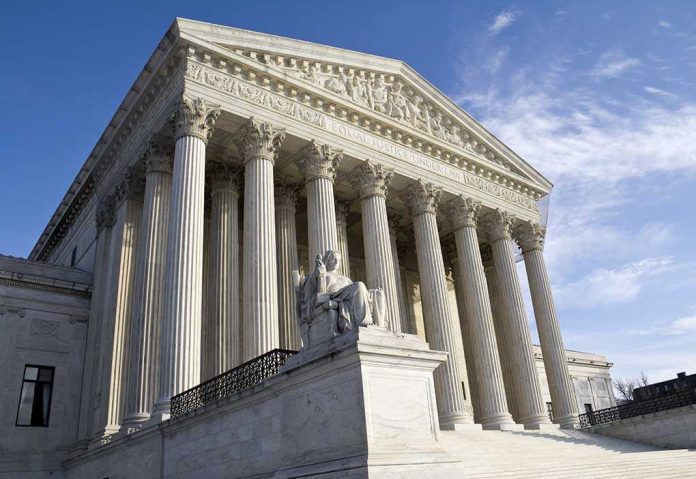
Supreme Court signals caution in Bayer’s Roundup cancer liability battle by seeking DOJ guidance, potentially shielding thousands of Americans from losing their right to hold manufacturers accountable for harmful products.
Key Takeaways
- The Supreme Court has requested Department of Justice input on Bayer’s appeal regarding Roundup cancer lawsuits, signaling potential landmark implications for product liability claims nationwide
- Bayer faces over 4,400 federal lawsuits claiming Roundup causes non-Hodgkin lymphoma, having already paid nearly $11 billion in settlements while still maintaining the product’s safety
- At the core of the case is whether federal pesticide regulations (FIFRA) preempt state-level failure-to-warn lawsuits, with circuit courts currently divided on the issue
- If Bayer succeeds, countless Americans diagnosed with cancer after using Roundup could lose their right to legal remedy and compensation
Supreme Court’s Pivotal Decision Could Reshape Product Liability Law
The Supreme Court’s recent request for Department of Justice input on Bayer’s appeal of Roundup cancer lawsuits marks a critical juncture in one of the most significant product liability battles in recent history. This move indicates the Court recognizes the far-reaching implications of any ruling on this case, which could fundamentally alter how Americans can hold corporations accountable for dangerous products. Bayer, which acquired Monsanto in 2018, has been fighting thousands of lawsuits claiming that Roundup’s active ingredient, glyphosate, causes non-Hodgkin lymphoma and that the company failed to warn users about this risk.
The central legal question revolves around whether the Federal Insecticide, Fungicide and Rodenticide Act (FIFRA) preempts state-level failure-to-warn lawsuits. Bayer argues that since the EPA has approved Roundup’s labeling, state laws requiring additional cancer warnings should be invalidated. Lower courts remain divided on this issue, with the 9th and 11th Circuits ruling in favor of plaintiffs while the 3rd Circuit sided with Bayer. This split among circuit courts makes Supreme Court intervention more likely and potentially more consequential for consumers nationwide.
The Mounting Evidence Against Roundup
Despite Bayer’s continued insistence that Roundup is safe, significant scientific evidence suggests otherwise. The International Agency for Research on Cancer, a respected authority on carcinogens, has classified glyphosate as a “probable carcinogen” in humans. This classification directly contradicts Bayer’s safety claims and has been a cornerstone of plaintiffs’ arguments in thousands of lawsuits across the country. The company’s decision to stop selling residential formulas containing glyphosate in 2023 appears to be a tacit acknowledgment of these concerns, despite their public stance.
“The International Agency for Research on Cancer classified the active ingredient that most Roundup formulas used to have, glyphosate, as a ‘probable carcinogen’ in humans,” shared Drugwatch.
Litigation against Bayer has been substantial, with the company already agreeing to pay nearly $11 billion to settle most Roundup cancer claims in 2020. However, thousands of cases remain pending, with 4,424 open federal lawsuits consolidated in California as of June 2025. These lawsuits primarily involve individuals who regularly used Roundup before being diagnosed with non-Hodgkin lymphoma and other blood cancers. Many plaintiffs were exposed at young ages or diagnosed after June 2018, making them eligible for compensation under current legal standards.
Biden Administration’s DOJ Input Could Be Decisive
The Supreme Court’s request for the Solicitor General’s opinion suggests the Biden administration will have significant influence over the outcome of this case. Bayer views this development positively, hoping the federal government will support their preemption argument. However, given the administration’s generally pro-consumer stance, there’s no guarantee the DOJ will side with the chemical giant. The timing of the Supreme Court’s decision remains uncertain, though Bayer has expressed hope for a resolution within a year, which would potentially end their ongoing liability nightmare.
“Roundup lawsuits filed against Monsanto (now Bayer) claim the weed killer caused cancer, and the company failed to warn about the health risks of glyphosate,” shared Drugwatch
For conservatives concerned about government overreach, this case presents a complex dilemma. While federal preemption typically aligns with conservative principles of limiting state regulatory powers, this particular application would effectively shield large corporations from accountability for harmful products. This raises serious questions about the balance between federal regulation and individuals’ rights to seek remedy when harmed by dangerous products. If Bayer succeeds in their appeal, thousands of Americans who believe they developed cancer from using Roundup could be left without legal recourse.









